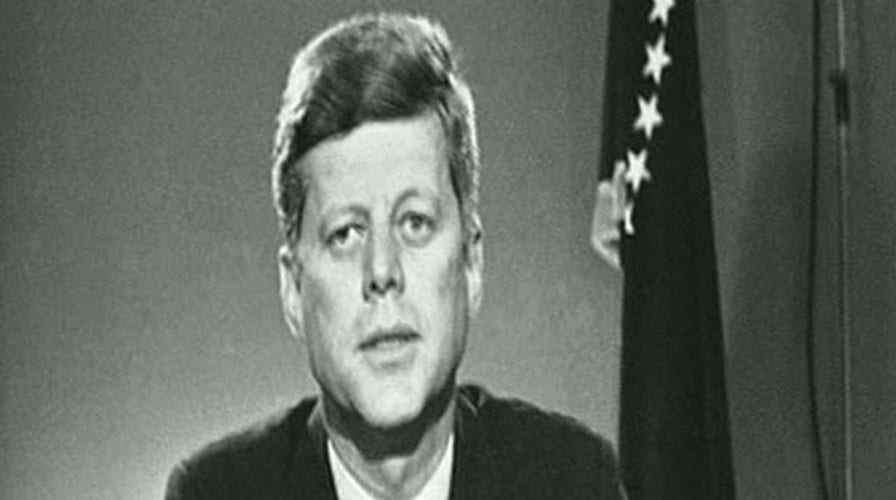Cavuto: Why don't liberals see 'wisdom' of cutting taxes?
Let's remember the wise words of JFK
Sometimes, try as I might, I can't get liberals to ever see the wisdom of cutting taxes.
It's like they'll do almost anything but give folks their money back.
Than ever back off the idiocy of more spending that just leaves us spent.
Stimulus that never stimulates and rescues that need still more rescues.
This is so simple. So why do they make it so hard?
Just give taxpayers a break, and you'll see this economy boom.
But no, because I'm the one saying it. And conservatives, by and large, preach it and the guy they really hate--
Ronald Reagan pounded it and triggered an economic boom doing it, they ignore it.
Then I stumbled upon something remarkable last night.
An interview nearly 50 years old.
With John F. Kennedy conducted by NBC's Chet Huntley and David Brinkley.
September 9, 1963.
A president who didn't know he had a little more than two months to live, arguing for a tax cut his own party was dead-set against.
Liberals listen up. This is your icon calling for bringing taxes down.
David Brinkley, 'Huntley-Brinkley Report': Mr. President, Harry Truman was out for his walk this morning and he said he did not think we should have a tax cut until we get the budget balanced, and the other day Senator Humphrey was saying in the Senate that what the American people think is true is very often more important than what actually is true. In view of all that, what do you think about cutting taxes while the budget is still in deficit?
President John F. Kennedy: The reason the government is in deficit is because you have more than 4 million people unemployed, and because the last 5 years you have had rather a sluggish growth, much slower than any other Western country. I am in favor of a tax cut because I am concerned that if we don't get the tax cut that we are going to have an increase in unemployment and that we may move into a period of economic downturn. We had a recession in '58, a recession in 1960. We have done pretty well since then, but we still have over 4 million unemployed. I think this tax cut can give the stimulus to our economy over the next 2 or 3 years. I think it will provide for greater national wealth. I think it will reduce unemployment. I think it will strengthen our gold position. So I think that the proposal we made is responsible and in the best interests of the country.
Chet Huntley: The affirmative economic response to Britain's tax cut seemed to be almost immediate. Would it be as immediate in this country, do you think?
President John F. Kennedy: I think it would be. Interestingly enough, the British came forward with their tax cut in April, passed it within a month. They have experienced economic benefits from it. Unemployment has been substantially reduced. They have a larger deficit than we do. Yet the only criticism was that it wasn't enough. Nearly every economist has supported us. I think it is in the best economic interests of the country, unless this country just wants to drag along, have 5 or 6 million people unemployed, have profits reduced, have economic prospects, have our budgets unbalanced by a much larger proportion. The largest unbalanced budget in the history of this country was in 1958 because of the recession--$12.5 billion. The fact of the matter is that, of course, government expenditures do go up in every administration, but the country's wealth goes up. President Eisenhower spent $185 billion more than President Truman. But the country was much wealthier. It is much wealthier now than it was in the last year of President Eisenhower's administration. I think our economic situation can be very good. I think what we have proposed is a responsible answer to a problem which has been part of our economic life for 5 or 6 years, and that is slack, failure to grow sufficiently, relatively high unemployment. If you put that together with the fact that we have to find 35,000 new jobs a week, I think the situation in this country calls for a tax reduction this year.
The irony is that JFK would eventually get that tax cut. But he wouldn't live to see it.
It would pass under his successor's administration, and for Lyndon Johnson, it provided the very economic boon Kennedy predicted.
But somehow it's lost in time.
Book-ended this half century later.
By a preacher's mesmerizing words on a hot August day in Washington.
And a president's untimely death on a November afternoon in Dallas.
Events so big, it's no wonder we forget what happened in between them.
News forgotten now. But a huge deal back then.
A liberal president pushing for a cut in taxes.
Before Bush.
Before Reagan.
The lion of the left arguing for giving average American taxpayers a break.
That was then.
Let's not forget the wisdom of his words.
Now.

